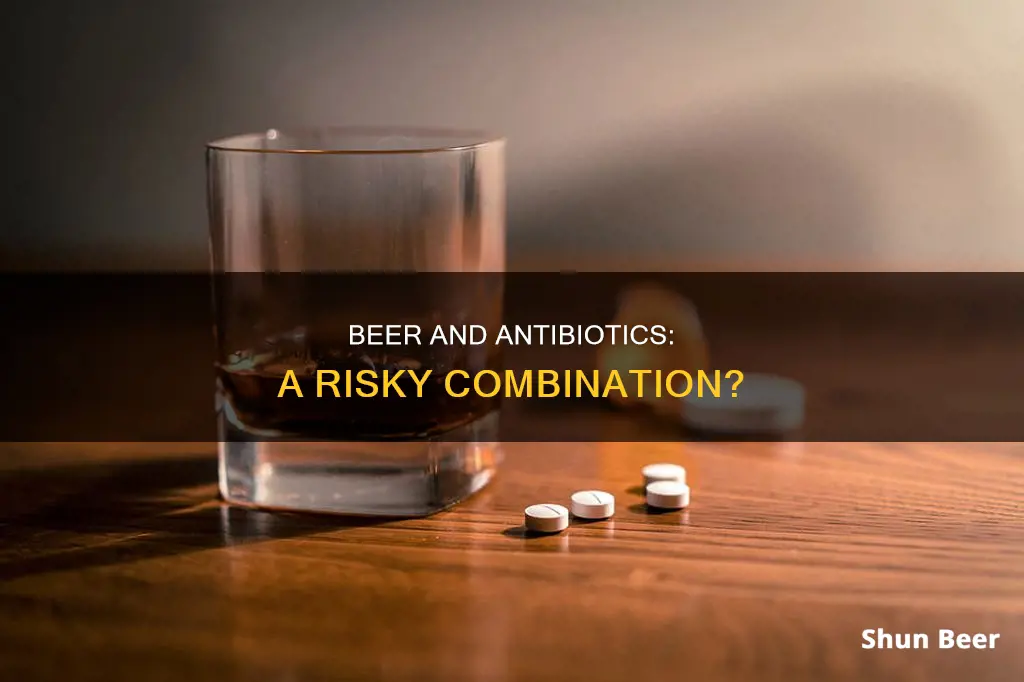
Drinking alcohol while taking antibiotics is generally not recommended, as it can negatively impact your recovery from illness in several ways. Alcohol can dehydrate you, disrupt your sleep, and hinder your body's ability to heal itself. It can also cause side effects such as nausea, digestive issues, and cognitive impairment, which may be amplified when combined with antibiotics.
While moderate alcohol consumption usually doesn't reduce the effectiveness of most antibiotics, it can still delay your recovery by reducing your energy levels. Additionally, certain antibiotics, such as metronidazole and tinidazole, can have dangerous interactions with alcohol, leading to severe side effects.
To ensure a safe and speedy recovery, it is best to avoid alcohol until you have completed your course of antibiotics and have fully healed. Consulting with your doctor or pharmacist about alcohol use while on antibiotics is always a good idea, as they can provide personalized advice based on your health status and the specific medication you are taking.
| Characteristics | Values |
|---|---|
| Effect on antibiotic effectiveness | Alcohol does not usually affect the effectiveness of antibiotics. However, in some cases, it may lead to unpleasant side effects and lower the effectiveness of the antibiotic. |
| Side effects | Alcohol and antibiotics can cause similar side effects, including nausea, upset stomach, dizziness, drowsiness, and vomiting. Alcohol can also worsen antibiotic side effects. |
| Liver function | Alcohol and antibiotics are both metabolized by the liver, so consuming both may increase the risk of liver damage. |
| Kidney function | Alcohol may increase the risk of kidney damage caused by antibiotics. |
| Sleep | Alcohol can disrupt sleep patterns, which is essential for recovery from an infection. |
| Hydration | Alcohol can cause dehydration, which can slow down recovery. |
| Nutrition | Alcohol can interfere with the absorption of nutrients, affecting recovery. |
| Immune system | Alcohol can weaken the immune system, making it easier to pick up contagious illnesses. |
| Recovery | Alcohol can delay recovery from illness and slow down the healing process. |
What You'll Learn
- Beer, wine, liquor, and beer are all alcoholic drinks that can affect your recovery from an infection
- Alcohol can cause dehydration and poor sleep, hindering the body's natural healing process
- Antibiotics and alcohol can cause similar side effects, including stomach upset, dizziness and drowsiness
- Alcohol can reduce your energy levels and delay recovery from illness
- Drinking alcohol with certain antibiotics can cause extreme nausea and vomiting

Beer, wine, liquor, and beer are all alcoholic drinks that can affect your recovery from an infection
Alcoholic drinks such as beer, wine, and liquor can negatively affect your recovery from an infection. While moderate alcohol consumption doesn't usually reduce the effectiveness of most antibiotics or cause serious interactions, it can still hinder your recovery process in several ways.
Firstly, drinking alcohol while fighting an infection can cause dehydration, upset stomach, sleep disruption, and a weakened immune response, hindering your body's natural ability to heal itself. Alcohol can also affect how some antibiotics are metabolised in the body, potentially reducing their effectiveness or increasing their toxicity. Certain antibiotics, such as metronidazole and tinidazole, are known to cause severe reactions when combined with alcohol, including extreme nausea, vomiting, and increased heart rate.
Additionally, both alcohol and antibiotics can have individual side effects that impact your behaviour and mental state. Consuming alcohol while taking antibiotics can amplify these effects and lead to additional side effects like vomiting, dizziness, drowsiness, headaches, and potentially life-threatening seizures. Alcohol can also interfere with essential processes during recovery, such as rest and proper nutrition. It can disrupt sleep patterns and prevent your body from absorbing vital nutrients, increasing blood sugar levels and reducing energy levels.
Furthermore, alcohol and antibiotics are both metabolised by the liver. Consuming excessive amounts of alcohol while taking antibiotics can increase the risk of liver and/or kidney failure. It is important to note that even a little alcohol can slow down your recovery, so it is generally recommended to avoid alcohol until you have completed your course of antibiotics and have fully recovered.
Drinking Beer in Amsterdam: What's Allowed in Public?
You may want to see also

Alcohol can cause dehydration and poor sleep, hindering the body's natural healing process
Alcohol can cause dehydration, which can hinder the body's natural healing process. Dehydration is the absence of enough water in the body, and it can occur when you lose more fluids than you take in. Alcohol increases urination because it is a small, nimble molecule that quickly enters the bloodstream and confuses the body's natural water level regulation system. This can lead to dark-coloured urine, dizziness, and even fainting.
Drinking alcohol can also interrupt normal sleep, which is necessary for the body to function properly. Sleep deprivation can affect the central nervous system, causing exhaustion, difficulty concentrating or learning new things, delayed signals, decreased coordination, and an increased risk of accidents. It can also negatively affect mental abilities and emotional states, such as increasing impatience and mood swings, compromising decision-making processes and creativity, and triggering mania in people with bipolar mood disorder.
Additionally, alcohol can lower the body's immune response, making it harder for the body to fight off invaders and increasing the time it takes to recover from illness. Therefore, drinking alcohol while taking antibiotics and fighting an infection can hinder the body's natural healing process.
Clear Liquid Diets: Root Beer's Place
You may want to see also

Antibiotics and alcohol can cause similar side effects, including stomach upset, dizziness and drowsiness
Antibiotics and alcohol can have similar side effects, including stomach upset, dizziness, and drowsiness. Consuming both at the same time increases the risk of experiencing these side effects. These risks can range from mild to life-threatening, depending on the individual and the amount consumed.
Stomach upset is a common side effect of both antibiotics and alcohol. Consuming alcohol can worsen the stomach-related side effects of antibiotics, such as nausea, vomiting, and stomach pain. Alcohol can also slow down the absorption of antibiotics into the bloodstream, which may reduce their effectiveness in fighting infections.
Additionally, both alcohol and antibiotics can cause dizziness and drowsiness. When mixed, they can have additive effects on the central nervous system, impacting cognitive function, concentration, and coordination. These additive effects can be particularly dangerous when performing activities that require alertness, such as driving or operating machinery.
It is important to note that the specific side effects experienced can vary depending on the type of antibiotic and the amount of alcohol consumed. Some antibiotics, such as metronidazole, tinidazole, and sulfamethoxazole, should never be mixed with alcohol as they can lead to more severe reactions, including extreme nausea and vomiting.
To avoid these potential side effects, it is generally recommended to avoid consuming alcohol while taking antibiotics. Waiting until you have completed your course of antibiotics and have fully recovered is the best approach.
Beer and Army Uniforms: What's the Official Stance?
You may want to see also

Alcohol can reduce your energy levels and delay recovery from illness
Alcohol can negatively impact your energy levels and delay recovery from illness in several ways. Firstly, alcohol can disrupt your sleep patterns and prevent you from getting a good night's rest, which is essential for healing and recovery. Secondly, alcohol can interfere with your body's ability to absorb vital nutrients, which can affect your energy levels and overall health. Additionally, alcohol can increase your blood sugar levels, which can further impact your energy and recovery.
Furthermore, alcohol can dehydrate your body, which can slow down the recovery process. Alcohol can also weaken your immune system, making it harder for your body to fight off infections and illnesses. This delay in recovery can increase your risk of developing another infection.
It is important to note that the effects of alcohol on energy levels and recovery may vary depending on the amount and frequency of alcohol consumption. Acute alcohol use, binge drinking, and chronic alcohol use can all have harmful effects on the body, regardless of whether you are taking medication or not.
Bottle-Fermented Beer: Does Age Matter?
You may want to see also

Drinking alcohol with certain antibiotics can cause extreme nausea and vomiting
Drinking alcohol while taking antibiotics is not recommended, as it can cause harmful interactions and negative effects on the immune system. Alcohol can directly inhibit the effectiveness of antibiotics and increase the risk of certain side effects, such as nausea and digestive issues.
When the body breaks down alcohol, it produces acetaldehyde, which can cause nausea. This effect can be amplified when combined with antibiotics, as many people taking these medications already experience stomach or digestive side effects. Additionally, both alcohol and antibiotics can negatively impact cognitive function, concentration, and coordination.
Drinking alcohol while taking antibiotics can also interfere with essential recovery processes such as sleep and hydration, which are critical for recovering from a bacterial illness. It is crucial to stay hydrated and well-rested to support the body's natural healing process.
Furthermore, mixing alcohol with certain antibiotics can lead to severe side effects, including extreme nausea, uncontrollable vomiting, and even damage to vital organs like the liver. Antibiotics such as Metronidazole, Linezolid, Sulfamethoxazole, and Trimethoprim can cause violent physical reactions when combined with alcohol. These reactions may include severe fatigue, intense headaches, anxiety, chest pain, and heart palpitations, in addition to gastrointestinal issues.
To avoid these potential risks, it is generally advised to refrain from consuming alcohol during antibiotic treatment and to follow the instructions provided by your healthcare provider. It is important to prioritize your health and well-being by abstaining from alcohol until you have completed your course of antibiotics.
Beer-Drinking and Frequent Urination: Why the Strong Link?
You may want to see also
Frequently asked questions
Drinking beer can slow down recovery from illness, so it is best to avoid it while taking antibiotics.
Drinking beer while taking antibiotics can cause nausea, vomiting, digestive issues, drowsiness, dizziness, and cognitive function issues. It can also lead to severe reactions such as liver and kidney damage.
Yes, antibiotics such as Metronidazole, Tinidazole, and Sulfamethoxazole should never be mixed with beer or any other form of alcohol.
It is generally recommended to wait until you have completed your course of antibiotics and have fully recovered before consuming beer or any other alcoholic beverage. For certain antibiotics, such as Metronidazole and Tinidazole, it is advised to wait at least 72 hours after the last dose before consuming alcohol.







